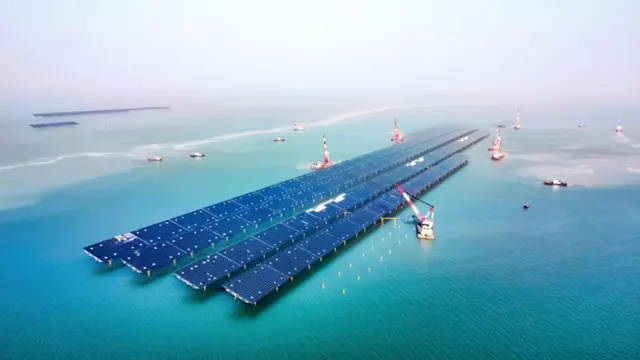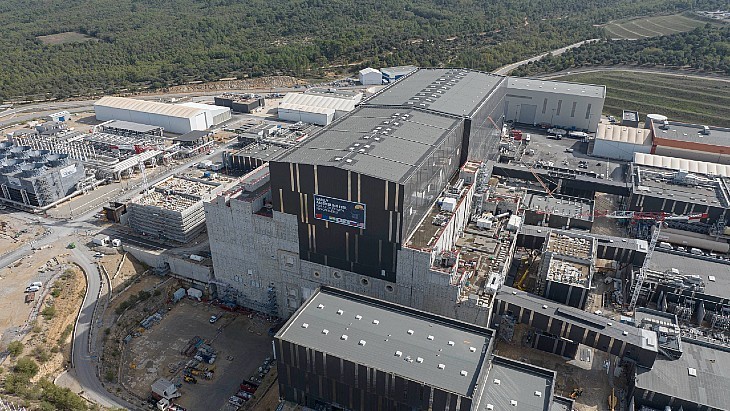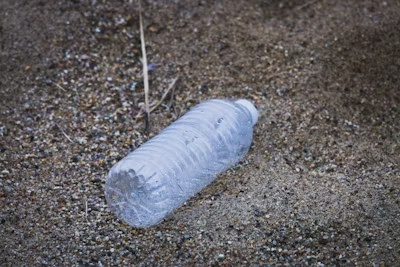
Neoterrex Resources Inc. (TSXV: NTX) has commenced a 1,500-meter maiden drill program at its Valour project, located in the highly prospective Abitibi geological subprovince of Quebec, Canada. The project is situated 60 kilometers northwest of Waswanipi and adjacent to Kenorland Minerals’ Chebistuan property, which is currently under an exploration agreement with Newmont Corp. The drill program will target magnetic bodies that exhibit strong electromagnetic responses and anomalous copper mineralization. The project area is characterized by favorable geological attributes, including volcanic and sedimentary rock units, a major unconformity, and a significant fold axis. Mathieu Stephens, President and CEO of Neoterrex, expressed optimism about the project’s potential. “We are excited about the potential for new discoveries at Valour, particularly given the region’s rich mining history. Our team has meticulously analyzed exploration data to refine our target delineation, and we are confident in the project’s prospects,” he said. Neoterrex is committed to responsible mining practices and community engagement. The company is actively collaborating with local communities to ensure transparency and minimize environmental impact. As the demand for critical minerals continues to grow, Neoterrex is well-positioned to capitalize on the opportunities presented by its portfolio of projects in Quebec. The company’s focus on exploration…

A new initiative, led by Nottingham Trent University and Loughborough University, aims to position the East Midlands as a global hub for rehabilitation technology innovation. The project, known as EMERGE (East Midlands Emerging RehabTech Growth Enterprise), is funded by a multi-million-pound grant from the UK Research and Innovation Engineering and Physical Sciences Research Council (EPSRC). EMERGE will connect hundreds of MedTech SMEs with healthcare professionals, academics, and the public to accelerate the development and deployment of cutting-edge rehabilitation technologies. By addressing key challenges such as access to skills, clinical partnerships, and investment, the project aims to drive innovation and improve patient outcomes. The initiative will focus on areas such as sensor technology, medical device materials, bioengineering, robotics, and artificial intelligence. By fostering collaboration between industry, academia, and healthcare providers, EMERGE will accelerate the translation of research into practical applications, ultimately benefiting patients and healthcare systems. Dr. Andrew Capel, from Loughborough University, highlighted the region’s strong foundation in rehabilitation science and its potential to become a global leader in the field. He emphasized the importance of the National Rehabilitation Centre (NRC) in driving innovation and improving patient care. The EMERGE project is committed to ensuring that the benefits of rehabilitation technology…

The Lithuanian government has pledged to address the challenges hindering the development of a high-tech industrial park, a key project in the country’s efforts to strengthen its semiconductor industry. The project, a joint venture with Taiwan’s Industrial Technology Research Institute (ITRI), aims to establish a state-of-the-art facility for semiconductor production. However, recent delays due to land rezoning issues and insufficient electricity supply have raised concerns about the project’s timeline. Lithuanian Prime Minister Ingrida Simonyte has assured that the government is taking steps to resolve these issues and expedite the project’s progress. The government is working closely with various agencies to streamline the regulatory process and ensure that the necessary infrastructure is in place. Arvydas Paukstys, a major shareholder of Teltonika, the company spearheading the project, expressed disappointment over the delays but remains optimistic about the project’s long-term prospects. He emphasized the importance of the project for Lithuania’s economic growth and technological advancement. The project, originally slated for completion in 2028, is now expected to be delayed by two to three years. Despite the setbacks, the Lithuanian government and Teltonika remain committed to the project and are working diligently to overcome the challenges. The successful implementation of this high-tech industrial park…

A proposed tungsten mining project in Madurai, India, has drawn criticism from activists, environmentalists, and local communities. The project, which would span over 5,000 acres in the Nayakkarapatti area of Melur taluk, has raised concerns about its potential impact on the environment and historical sites. Opponents of the project worry about the potential for deforestation, water pollution, and air quality degradation. They also express concern about the proximity of the proposed mining site to the Alagar hills, a biodiversity heritage site and a place of cultural significance. Madurai MP, Su Venkatesan, has voiced his objections to the project, questioning how the central government can clear a project near eco-sensitive and historic areas while being slow to approve archaeological projects. He urged the state government to reject the project, citing potential damage to natural resources and historical evidence. The project, awarded to Hindustan Zinc Limited, a subsidiary of the Vedanta Group, has yet to receive final approval. The debate surrounding the project highlights the ongoing tension between economic development and environmental protection in India.

Chile’s environmental review agency, the SEA, has reported a significant surge in project approvals during October 2023. The agency greenlit 32 projects worth US$3.45 billion, surpassing the previous month’s figures and setting a new record for the year. The surge in approvals can be attributed to increased investment in the real estate sector, which offset a slight decline in energy projects. Notably, the Maratué urban housing development, valued at US$2 billion, was one of the largest projects approved during the month. Other significant projects that received approval include the Centro Norte logistics park, the El Almendro wind farm, the La Mocha photovoltaic park, and modifications to the Lomas de Taltal wind farm. The SEA’s approval process plays a crucial role in Chile’s economic development by ensuring that projects comply with environmental regulations and contribute to the country’s sustainability goals. The agency’s efficient and transparent review process has been instrumental in attracting foreign investment and fostering economic growth. As Chile continues to prioritize sustainable development, the SEA’s role in facilitating the approval of environmentally sound projects will remain essential. By streamlining the approval process and promoting sustainable practices, the agency can help Chile achieve its climate and environmental goals.

China Energy Investment Corp (CHN Energy) has made significant strides in its renewable energy initiatives, successfully connecting a 3-GW solar power plant and a 1-GW offshore photovoltaic park to the Chinese grid. The 3-GW Mengxi Blue Ocean Photovoltaic Power Station, built on a former coal mining site in Inner Mongolia, is now fully operational. This massive solar power plant, comprising 5.9 million solar panels, is expected to generate 5.7 billion kWh of clean electricity annually, powering approximately 2 million households. By utilizing a previously mined area, the project demonstrates a commitment to sustainable development and land reclamation. In another groundbreaking achievement, CHN Energy has switched on the first batch of photovoltaic units at a 1-GW offshore solar park in Kenli District, eastern China. This pioneering project, the world’s largest offshore solar plant, covers an area of approximately 1,223 hectares and will generate 1.78 billion kWh of clean electricity annually. Both projects are expected to significantly reduce carbon emissions and contribute to China’s renewable energy goals. By harnessing the power of solar energy, CHN Energy is leading the way in the transition to a low-carbon future.

Fusion for Energy (F4E), the European organization managing Europe’s contribution to the ITER project, has secured a significant contract with the b.NEXT consortium. This collaboration extends the successful partnership between F4E and the consortium, leveraging their expertise in delivering key infrastructure for the world’s largest fusion experiment. The ITER project aims to demonstrate the feasibility of fusion as a clean and limitless energy source by building a tokamak fusion device. F4E plays a crucial role by contributing nearly half the project’s construction cost and overseeing the delivery of crucial infrastructure. The new contract, expected to run until 2030 with the possibility of extension, builds on the consortium’s previous successful collaboration. It utilizes their proven track record in engineering, project management, and the application of cutting-edge digital technologies for automation. Under this agreement, b.NEXT will provide a range of services, including consulting, design, nuclear safety management, construction support, and project management. This comprehensive approach ensures the successful completion of civil and mechanical works at the ITER construction site. This continued partnership is an example of successful international collaboration. With thirty-three nations contributing to ITER, F4E’s collaboration with b.NEXT demonstrates Europe’s commitment to the project’s success. The involvement of the consortium in…

Liverpool John Moores University (LJMU) has been recognized for its commitment to sustainability in the delivery of its Byrom Street campus transformation project. The project, which involved the creation of a new student zone, a staff lounge, and enhanced facilities for the School of Pharmacy and Biomolecular Sciences and the School of Engineering, has achieved a SKA Silver rating. The SKA rating is a recognized industry standard that assesses the sustainability performance of buildings. LJMU’s project was commended for its focus on energy efficiency, waste reduction, water conservation, and the creation of a comfortable and healthy learning environment. The university’s investment in sustainable practices reflects its commitment to environmental responsibility and social impact. By prioritizing energy efficiency, reducing waste, and improving indoor air quality, LJMU is creating a more sustainable campus for its students and staff. This achievement highlights LJMU’s dedication to providing high-quality facilities and a positive learning experience. The university remains committed to sustainable development and will continue to seek innovative ways to reduce its environmental impact.

NASA has announced a significant investment of $11.5 million to fund five research projects aimed at revolutionizing aviation technology. The initiative, known as the Advanced Aircraft Concepts for Environmental Sustainability (AACES) 2050 program, seeks to identify innovative solutions to reduce the environmental impact of air travel. The selected projects will explore cutting-edge concepts and technologies that could significantly improve aircraft efficiency, reduce emissions, and enhance overall sustainability. By investing in research and development, NASA aims to shape the future of aviation and ensure a more sustainable future for air travel. The awardees, including Aurora Flight Sciences, Electra, JetZero, Pratt & Whitney, and the Georgia Institute of Technology, will work on a range of projects, from advanced propulsion systems to novel aircraft designs. These studies will provide valuable insights into the potential of emerging technologies to address the aviation industry’s environmental challenges. As the aviation industry continues to grow, there is an urgent need to reduce its carbon footprint. By investing in research and development, NASA is taking a proactive approach to addressing this challenge and ensuring the long-term sustainability of air travel.

A consortium of leading European organizations, including European Bioplastics, AIMPLAS, TotalEnergies Corbion, Novamont, Corbion, Sulapac, and Kaneka, has launched the ReBioCycle project. This ambitious initiative, led by University College Dublin and BiOrbic Bioeconomy SFI Research Centre, aims to develop and implement new technologies for recycling biobased biodegradable plastics. The ReBioCycle project focuses on separating and recycling three types of bioplastics: polylactic acid (PLA), polyhydroxyalkanoates (PHAs), and starch-based bioplastics. By re-adapting and upscaling existing sorting technologies, the project aims to demonstrate the feasibility and economic viability of bioplastic recycling at an industrial scale. Prof. Kevin O’ Connor, coordinator of the project, expects that the “ReBioCycle will scale up and demonstrate biobased biodegradable plastics recycling technologies. Biobased biodegradable plastics can be kept in the material cycle for as long as possible through innovative recycling technologies, thus demonstrating that end-of-life biobased biodegradable plastics can be used in the circular bioeconomy.” The project will also contribute to the development of a European blueprint for circular bioplastics, providing valuable insights into the state-of-the-art recycling technologies and their potential impact on the bioeconomy. This blueprint will support the implementation of EU policies such as the Bioeconomy Strategy, the Circular Economy Action Plan, and the future Packaging…










